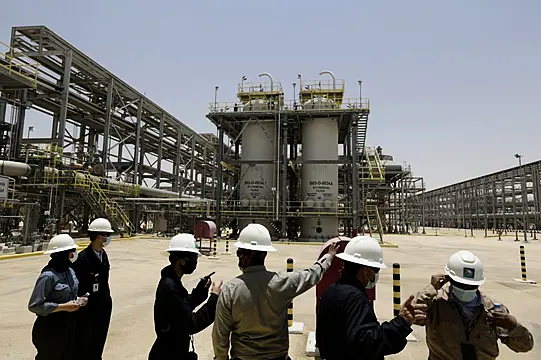Oil giant Saudi Aramco has reported a 42.4 billion dollar (£36.8bn) profit in the third quarter of this year, buoyed by the higher global energy prices that have filled the kingdom’s coffers but helped fuel inflation worldwide.
The oil firm’s profits will help fund the kingdom’s assertive Crown Prince Mohammed bin Salman’s plans for a futuristic city on the Red Sea coast, but also comes as the US grows increasingly frustrated by higher prices at the pump eating into American consumer’s wallets.
Those tensions yet again have chilled relations between Riyadh and Washington before the November 8 midterm elections.
In a note to investors, the predominantly state-owned oil company said its average barrel of crude sold for 101.70 dollars in the third quarter — up from 72.80 dollars at the same point last year. It is Aramco’s second-largest quarterly profit in its history, just before its second-quarter results this year saw a profit of 48.4 billion dollars (£42bn).

It put its profits so far in 2022 at 130.3 billion dollars (£113bn), compared to 77.6 billion (£67/4bn) in 2021.
“While global crude oil prices during this period were affected by continued economic uncertainty, our long-term view is that oil demand will continue to grow for the rest of the decade given the world’s need for more affordable and reliable energy,” Aramco CEO Amin H Nasser said.
Aramco will keep its dividend this quarter at 18.8 billion dollars (£16.3bn), the world’s highest.
Benchmark Brent crude traded just shy of 95 dollars a barrel on Tuesday. The sliver of Aramco that the kingdom has put on Riyadh’s Tadawul stock market stood at 9.29 dollars a share before trading Tuesday — putting its valuation at just over 2 trillion dollars. Only Apple’s valuation, at 2.44 trillion, is higher.
Opec and a loose confederation of other countries led by Russia agreed in early October to cut its production by 2 million barrels of oil a day, beginning in November.
Opec, led by Saudi Arabia, has insisted its decision came from concerns about the global economy. Analysts in the US and Europe warn a recession looms in the West from inflation and subsequent interest rate hikes, as well as food and oil supplies being affected by Russia’s war on Ukraine.
In Washington, anger has grown with Saudi Arabia, particularly from President Joe Biden, who travelled to the kingdom in July and shared a fist bump with Crown Prince Mohammed. Mr Biden recently warned the kingdom that “there’s going to be some consequences for what they’ve done”.
Saudi Arabia lashed back, publicly claiming the Biden administration sought a one-month delay in the Opec cuts that could have helped reduce the risk of a spike in gas prices ahead of the US midterm elections.
Mr Biden on Monday separately accused oil companies of “war profiteering” as he raised the possibility of imposing a windfall tax on American energy companies if they do not boost domestic production.







